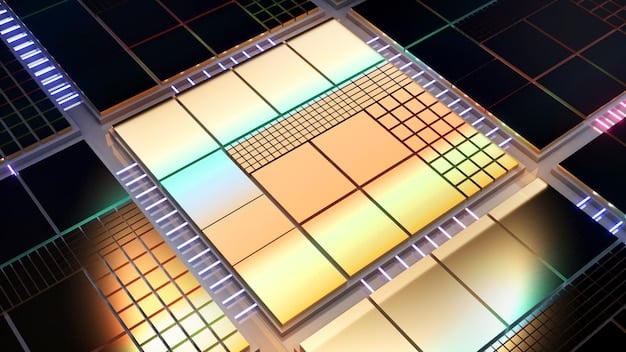Quantum Computing for Beginners: A US Geek’s Guide [2025]
![Quantum Computing for Beginners: A US Geek’s Guide [2025]](https://dorama2you.com/wp-content/uploads/2025/06/dorama2you.com_3_1749769492_79bdbcc1_cover.jpg)
Quantum computing demystified for US geeks in 2025, this guide bridges the gap between complex theory and practical understanding, offering insights into the quantum realm’s potential and how to get started.
Ready to delve into the fascinating world of quantum computing? This comprehensive guide is tailored for US geeks like you, providing a beginner-friendly roadmap to understanding and exploring the potential of quantum computing for beginners: a practical guide for US geeks in 2025. Forget complex jargon; we’ll break down the essentials in an accessible way.
What is Quantum Computing, Really?
Quantum computing is often portrayed as a futuristic technology far removed from everyday reality. But what exactly is it, and why is it generating so much buzz? Let’s break down the core principles behind this revolutionary field.
Classical vs. Quantum: The Fundamental Difference
Classical computers, the ones we use daily, store information as bits, which are either 0 or 1. Quantum computers, however, use quantum bits, or qubits. A qubit can be both 0 and 1 simultaneously, thanks to a phenomenon called superposition. This allows quantum computers to perform calculations in a fundamentally different way.
Superposition and Entanglement: The Quantum Magic
Superposition is just one piece of the puzzle. Another key concept is quantum entanglement, where two qubits become linked, and the state of one instantly influences the state of the other, regardless of the distance between them. These quantum properties unlock immense computational power.
- Superposition: Enables qubits to exist in multiple states at once, dramatically increasing computational possibilities.
- Entanglement: Creates interconnected qubits, allowing for complex calculations to be performed in parallel.
- Quantum bits (Qubits): The building blocks of quantum computers, leveraging superposition and entanglement.

In essence, quantum computing harnesses the principles of quantum mechanics to solve problems that are intractable for classical computers. This opens up possibilities in various fields, from medicine to materials science.
The Potential Applications of Quantum Computing
Quantum computing isn’t just a theoretical concept; it has the potential to revolutionize numerous industries. Here are some key areas where quantum computers could make a significant impact.
Drug Discovery and Development
Simulating molecular interactions is incredibly complex for classical computers. Quantum computers, however, could accurately model these interactions, accelerating the discovery and development of new drugs and personalized medicine approaches.
Materials Science and Engineering
Designing new materials with specific properties requires understanding the behavior of atoms and molecules at the quantum level. Quantum computers could simulate these behaviors, leading to the creation of stronger, lighter, and more efficient materials.
Financial Modeling and Risk Management
Financial markets are incredibly complex, and accurate modeling is crucial for risk management and investment strategies. Quantum computers could analyze vast amounts of data and identify patterns that are impossible for classical computers to detect.
Quantum computing also shows promise in other areas:
- Cryptography: Developing unbreakable encryption methods to protect sensitive data.
- Artificial Intelligence: Enhancing machine learning algorithms and creating more powerful AI systems.
- Logistics and Optimization: Optimizing complex supply chains and transportation networks for greater efficiency.
The applications of quantum computing are vast and still being explored. As the technology matures, we can expect even more groundbreaking discoveries and innovations.
Understanding Quantum Hardware Options
While the concept of qubits is central to quantum computing, there are several different technologies being used to create and control them. Each approach has its own strengths and challenges. Let’s examine some of the leading hardware options.
Superconducting Qubits
Superconducting qubits are based on the principles of superconductivity, where certain materials exhibit zero electrical resistance at extremely low temperatures. Companies like IBM and Google are heavily invested in this technology. These quantum chips operate at temperatures colder than outer space.
Trapped Ion Qubits
Trapped ion qubits use individual ions (electrically charged atoms) that are trapped and controlled using electromagnetic fields. This approach offers high fidelity and long coherence times, meaning the qubits can maintain their quantum state for extended periods. IonQ is a prominent player in this field.
Photonic Qubits
Photonic qubits utilize photons (particles of light) as qubits. This approach is promising because photons are less susceptible to environmental noise, potentially leading to more stable and reliable quantum computers. These use lasers and mirrors to create quantum systems.

Each of these hardware approaches is constantly evolving, and the optimal choice for a particular application will depend on the specific requirements of the problem being solved. Superconducting, Trapped Ion and Photonic Qubit systems all have pros and cons.
Getting Started with Quantum Computing: A Geek’s Path
So, you’re a US geek ready to dive into the quantum realm. Where do you begin? Fortunately, several resources and platforms can help you start your quantum computing journey.
Quantum Computing Software Development Kits (SDKs)
SDKs provide the tools and libraries needed to write and run quantum programs. Some popular options include:
- Qiskit (IBM): An open-source SDK for working with superconducting qubits.
- Cirq (Google): Another open-source SDK designed for near-term quantum computers.
- PennyLane (Xanadu): A cross-platform Python library for quantum machine learning, compatible with different hardware platforms.
Cloud-Based Quantum Computing Platforms
Several companies offer access to their quantum computers through the cloud. This allows you to experiment with real quantum hardware without needing to build your own.
Major players include:
- IBM Quantum Experience: Provides access to IBM’s superconducting quantum computers.
- Amazon Braket: A cloud service that lets you run quantum algorithms on different hardware platforms.
- Azure Quantum: Microsoft’s quantum computing platform, offering access to various quantum hardware and software solutions.
These platforms offer tutorials, documentation, and example code to help you get started. These platforms can also be expensive, but offer hands on experience with real quantum processing units.
Educational Resources and Online Courses
Numerous online courses and educational resources are available to help you learn the fundamentals of quantum computing. Platforms like Coursera, edX, and Quantum Computing Playground offer courses ranging from introductory to advanced levels. Many universities have open courseware that can be reviewed.
Don’t be afraid to experiment and explore. The best way to learn quantum computing is by getting your hands dirty and trying things out.
The Challenges and Future of Quantum Computing
While quantum computing holds immense promise, it’s essential to acknowledge the challenges that still need to be overcome before it becomes a mainstream technology. Let’s examine some of the key hurdles and the potential future developments.
Decoherence: Maintaining Quantum States
One of the biggest challenges is decoherence, which refers to the loss of quantum properties due to interactions with the environment. Qubits are incredibly sensitive, and even slight disturbances can cause them to lose their superposition and entanglement, leading to errors in calculations. Keeping the hardware cool also takes significant energy.
Scalability: Building Larger Quantum Computers
Current quantum computers have a limited number of qubits. To tackle complex problems, we need to build quantum computers with significantly more qubits. Scaling up the number of qubits while maintaining their fidelity is a major engineering challenge. This scaling may also require new methods of production.
Error Correction: Ensuring Accuracy
Quantum computers are prone to errors. Developing effective error correction techniques is crucial for ensuring the accuracy of quantum computations. Quantum error correction is an active area of research.
Despite these challenges, significant progress is being made. Researchers are constantly developing new techniques to improve qubit stability, scalability, and error correction. As these challenges are addressed, we can expect to see even more powerful and practical quantum computers in the future. Governments around the world are investing into basic research and development in this field.
Quantum Computing in the US: A 2025 Perspective
As we look ahead to 2025, the US is poised to be a leader in the quantum computing revolution. Government initiatives, academic research, and private sector investments are all contributing to the growth of the quantum ecosystem in the country. The importance of quantum computing is even more obvious in the context of geopolitical considerations.
Government Support and Funding
The US government has recognized the strategic importance of quantum computing and has launched several initiatives to support its development. These include funding for research and development, as well as efforts to foster collaboration between government, academia, and industry.
Academic Research and Innovation
US universities are at the forefront of quantum computing research, with leading institutions conducting groundbreaking work in qubit technologies, quantum algorithms, and quantum software. The collaboration between universities and industry helps to accelerate the translation of research findings into practical applications.
Private Sector Investment and Growth
Companies like IBM, Google, Microsoft, and Amazon are investing heavily in quantum computing, building their own quantum computers and developing quantum software and services. This private sector investment is driving innovation and creating a vibrant quantum industry in the US. Many startups are also entering the market.
By 2025, we can expect to see even more advancements in quantum computing in the US, with the emergence of new applications and the development of more powerful and accessible quantum computers. The US, in 2025, should be able to solve complex problems with quantum architectures.
| Key Point | Brief Description |
|---|---|
| 💡 Qubits | Qubits use superposition and entanglement for powerful computation. |
| 🔬 Applications | Drug discovery, materials science, and financial modeling are key applications. |
| ☁️ Cloud Access | Cloud platforms offer access to quantum hardware and software. |
| 🚀 US Leadership | The US is set to lead in quantum computing with government and private support. |
FAQ
▼
Quantum computing uses qubits, which can exist in multiple states simultaneously (superposition), while classical computing uses bits that are either 0 or 1. This fundamentally changes computational power.
▼
Quantum computing can revolutionize drug discovery, materials science, finance, and cryptography, by solving problems too complex for classical computers, unlocking new possibilities.
▼
Start with online courses, quantum SDKs (like Qiskit or Cirq), and cloud-based quantum platforms. Experimenting with these resources can help you grasp the fundamentals.
▼
Decoherence (loss of quantum properties), scalability (building larger computers), and error correction are major hurdles. Overcoming these is crucial for practical quantum computers.
▼
The US is a leader in quantum computing, with significant government support, academic research, and private sector investment driving innovation and growth in the field.
Conclusion
As we approach 2025, the landscape of quantum computing presents a fascinating and rapidly evolving frontier for US geeks. By understanding the fundamentals, exploring accessible resources, and keeping an eye on the advancements being made, you can position yourself to be a part of this exciting technological revolution. The journey into quantum computing begins now.




